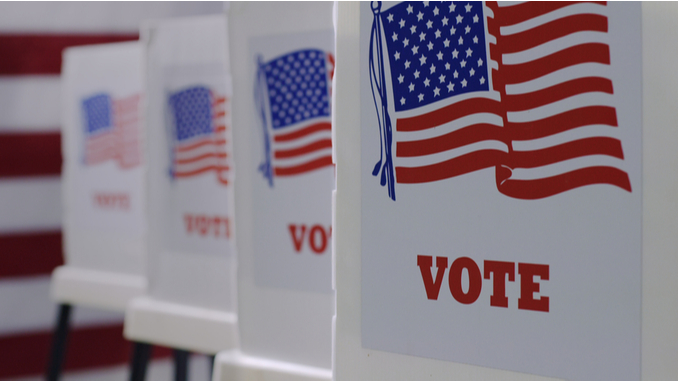
by AZ Free Enterprise Club | Feb 20, 2022 | Opinion
By the Arizona Free Enterprise Club |
The Left is determined to shove their so-called “election reforms” down the throats of the American people. After gaining control of Congress, the US House passed House Resolution 1 (HR1) in March of last year.
But their federal takeover of elections has been held up in the U.S. Senate for months, so they have moved to ‘Plan B’—taking over the election process in Arizona.
Earlier this month, a group called the Arizonans for Free and Fair Elections—which is nothing more than a consortium of liberal groups here in Arizona—dropped a ballot initiative that might as well be a leftist wish list of election law changes. But while they’ll tell you that this measure is about “expanding voting rights,” make no mistake. Just like with HR1, this ballot measure is about eliminating all meaningful safeguards in our voting process.
>>> CONTINUE READING >>>

by Dr. Thomas Patterson | Feb 17, 2022 | Opinion
By Dr. Thomas Patterson |
When Joe Biden assumed the presidency one year ago, America had finally achieved energy independence. Iran was in chaos, fearing that its nuclear ambitions had been dashed. A year later, it’s America’s interests that have been dashed.
Biden campaigned on a pledge to rejoin the Iran nuclear accord and work on its weaknesses later. He seemed to believe that reinstituting deference and tacit assurances of eventual nuclear power status to Shiite Muslims would win concessions from the world’s leading state sponsor of terrorism. It didn’t work out.
Monitoring for compliance allowed under the treaty was notably lax. Still, at the end of 2020, the United Nations watchdog agency was investigating Iran for cheating on nuclear materials and production with a pending referral to the UN Security Council. Economic sanctions under the treaty had produced an economic crisis with mass protests throughout the country. Iran was reeling.
Biden came to the rescue. Instead of cracking down on Iran’s noncompliance with the treaty, he pressured America’s allies to pull back a censure resolution, sending a clear message to Iran that the US no longer minded that they were hiding nuclear sites and materials, in violation of the treaty and global nonproliferation agreements.
Iran immediately began investigating the new limits of America’s tolerance. The regime refused UN access to nuclear sites and increased uranium enrichment to 60%, far beyond the level required for peaceful nuclear power production.
Meanwhile, Iranians stepped up their violence in the region, including drone and rocket attacks on American forces. Biden not only refused to respond militarily to the terrorist attacks, but he ended support for a Saudi-led campaign against the Iran-backed Houthis and removed America’s defense missiles from Saudi Arabia.
As Iran accelerated its nuclear program and regional military aggression, Biden inexplicably helped avoid a financial crisis too. He suspended sanctions, giving Iran accessibility to frozen funds and to Chinese oil imports.
Iran is up and running. We better hope that the mullah are just kidding with their “Death to America” chants.
Biden’s response to America’s energy needs has been similarly woke and pathetic. At the conclusion of the Trump presidency, America had achieved energy independence for the first time in 50 years.
Trump encouraged the shale oil and gas revolution. He lifted restrictions on drilling, especially in remote areas. He permitted vitally needed pipelines. He blocked extreme environmental regulations that intentionally reduced our gas and oil supplies. As a result, America had surplus fuel supplies and no longer had to import oil from Arabs, Russians, Iranians, or Mexicans.
Biden promptly, inexplicably (simple Trump hatred?) reversed all the Trump policies when in office. We’re importing again. The economic cost of losing our energy independence is about $50 billion annually.
Now Biden has to grovel, unsuccessfully, with OPEC to increase production. Once again, we have to be mindful of our energy needs when dealing with foreign actors.
Moreover, even if you believe only massive carbon reduction mandates can keep the planet from burning, none of this affects climate change. The Biden reforms don’t affect which fuels we consume, only whether we buy them from our own producers or overseas, where power plants are often more polluting than ours.
America’s worst enemy could hardly have inflicted more damage than has our own president. In thrall to a tiny faction of far-left ideologues, Biden has suffered multiple other failures, too, including immigration, inflation, urban crime, and school closures.
Unfortunately, here’s where it gets partisan and divisive. The solemn duty of the Republican party is to remove this person and his ilk from office before they do more irreversible harm to the republic. That duty includes nominating the quality candidates most likely to win elections, which may not always be the ones most popular with Republicans.
In 2020, Trump lost an election to an exceptionally weak candidate who hardly campaigned and who was uninspiring even to his own supporters. Considering historical precedent and his record in office, Trump deserved to win in a landslide.
Instead he lost. Hard as it may be to accept, many voters wanted somebody, anybody who “wasn’t Trump.”
In service to their country and posterity, Republicans need to be more strategic, starting now. It’s important.

by Andrew Gould | Feb 15, 2022 | Opinion
By Andrew Gould |
The recent US Supreme Court decisions around mask mandates have understandably generated a great deal of media coverage and comment. Many conservatives have praised the Supreme Court’s decision to affirm the stay on the nationwide OSHA vaccine mandate. But as a lifelong prosecutor and judge, I can assure you the true and most significant factor has been overlooked. Specifically, based on the Court’s decision to vacate the stay regarding the vaccine mandate for healthcare workers (the “CMS Mandate”), the President, with no constitutional or legal authority, has been allowed to order ten million healthcare workers to receive a vaccine or risk losing their jobs and their livelihood. And while state legislatures, exercising their police powers, have imposed vaccine requirements on healthcare workers in the past, no President has imposed a nationwide mandate involving such a permanent, personal healthcare decision. Simply put, as Judge Sutton recently stated in In re MCP No. 165, unlike masks or gloves, “vaccines cannot be removed at the end of the shift.”
The underlying legal justification for overturning mask mandates on businesses is the same legal basis that should have driven a decision to roll back a mask mandate for our health care workers. In both the OSHA and the CMS cases, the issue was not whether vaccines were a wise or effective measure against the spread of COVID-19. Rather, the issue was simply whether the President has the constitutional authority, through executive branch administrative agencies, to impose nationwide vaccine mandates. In the OSHA case, the Court held, by a vote of 6-3, that because Congress never clearly delegated such authority to the President, he lacked the authority to impose such a mandate. However, in the CMS case, Justices Roberts and Kavanaugh switched their votes on the grounds that Congress had delegated such authority to the President based on a hodge-podge of Social Security statutes. But these statutes provide no such authority. Indeed, the purported delegation for the CMS mandate was less clear and more strained than the statutes offered to justify the OSHA mandate. So, what explains the puzzling switch of two purportedly conservative Justices on essentially the same issue?
It is difficult to avoid the conclusion that Roberts and Kavanaugh, at least at some level, sought to appease the public’s concern over COVID. Thus, in effort to “soften” the public’s reaction to the OSHA decision, they justified the switch by relying on the purportedly stronger policy arguments for mandating vaccines for healthcare workers to protect hospital patients from COVID. But while politics and the will of the public has rightfully driven decision-making in our Executive and Legislative branches of government, our Judiciary was set up by our Founding Fathers to make judgements based on the law and precedent. The Supreme Court does not have the authority to determine whether vaccine mandates are good policy, nor may the Court violate the Constitution in the interests of promoting political harmony or the popularity of the Court. As Justice Scalia once stated, “If you’re going to be a good and faithful judge, you have to resign yourself to the fact you’re not always going to like the conclusions you reach. If you like them all the time, you’re probably doing something wrong.”
With these recent decisions around mask mandates, Justices Roberts and Kavanaugh have dangerously broken through that critical differentiation, opening the Court up to the influence of the day’s ever-changing political environment. Judges must have the courage and resolve to enforce the Constitution, even when the results may be unpopular. It may appease some that the OSHA stay was upheld, but it was denied for healthcare workers. But either way, the result is the same: a precedent has been set by the Court allowing the President to use any crisis labelled a “medical emergency” to expand his power. The consequences of this decision will inflict grave damage to the rule of law. As Justice Jackson stated in his dissent in Korematsu v. United States, when the Court permits another branch to set aside constitutional protections to address emergencies, such decisions lie “about like a loaded weapon ready for the hand of any authority that can bring forward a plausible claim of an urgent need.”
Of course, looming in the background is the Supreme Court’s pending abortion decision in Dobbs v. Jackson Women’s Health Organization. There are sound legal grounds set forth in Dobbs for modifying, if not overruling Roe v. Wade, and allowing the legislative branch to decide the abortion issue. But mark my words, the Supreme Court, led by Justices Roberts and Kavanaugh, will land on a more muddled, middle of the road, politically crafted decision that attempts to please everyone. They have shown their hand in the CMS case.
Andrew W. Gould was appointed as a Justice to the Arizona Supreme Court in 2017 after serving 5 years on Division One of the Arizona Court of Appeals. He retired from the Supreme Court in March 2021. Prior to his appointment to the Court of Appeals, Justice Gould spent 11 years as a Judge of the Superior Court in Yuma County, where he served as both Associate Presiding Judge and Presiding Judge.
Andrew received his J.D. from Northwestern University School of Law in 1990. He began his legal career in Phoenix, Arizona, practicing in the field of civil litigation. In 1994, he became a Deputy County Attorney, prosecuting major criminal cases for Yuma and Maricopa Counties. He served as Chief Civil Deputy for the Yuma County Attorney’s Office from 1999-2001. Justice Gould has previously served on the Arizona Supreme Court Commission on Technology, as the President of the Arizona Judges’ Association, and has taught at the Judicial Conference and New Judge Orientations.

by AZ Free Enterprise Club | Feb 12, 2022 | Opinion
By the Arizona Free Enterprise Club |
This is probably hard to believe, but there once was a day when journalists didn’t feel the need to include their own slants and biases. When they didn’t make themselves a part of the story. When they would simply report the news.
Unfortunately, those days are long gone. Today’s establishment media is much more concerned with protecting its own interests—and the interests of those they’re in bed with. We’ve seen this mentality at the national level for quite some time, but now it’s taken over our local media as well—especially right here in Arizona.
The latest comes from ABC15 news anchor Steve Irvin. If you’re not sure what Steve stands for, you don’t need to look much further than his professional Twitter account where he regularly spews liberal talking points, refers to people he disagrees with as “bigots,” and shares his disdain for school choice.
Now, that last one has won him an award….
>>> CONTINUE READING >>>

by AZ Free Enterprise Club | Feb 9, 2022 | Opinion
By the Arizona Free Enterprise Club |
Two weeks ago, we outlined the history of the federal only voter list. As a summary, in 2004 Arizona voters approved Prop 200 which required county recorders to reject any application for registration that did not include Documentary Proof of Citizenship (DPOC). After passage, Arizona did reject applications without DPOC—those made on both the state voter registration form and federal voter registration form established by the National Voter Registration Act (NVRA) in 1993.
In 2014, Arizona began accepting federal voter registration forms that did not include DPOC and registering voters as “Federal Only Voters” eligible to vote for President, U.S House, and U.S. Senate following the 7-2 Supreme Court decision, Inter Tribal Council, deciding that the NVRA preempts Prop 200’s DPOC requirement.
Then, in 2019, Arizona began accepting all applications for registration that did not include DPOC after Secretary of State Michelle Reagan and Maricopa Recorder Adrian Fontes entered into a consent decree with the League of United Latin American Citizens (LULAC) agreeing that the state could accept applications for registration without DPOC and somehow stay in compliance with the Prop 200 requirement to the contrary – to reject them.
HB2492 tackles this complicated issue with five main provisions.
>>> CONTINUE READING >>>

by AZ Free Enterprise Club | Feb 6, 2022 | Opinion
By the Arizona Free Enterprise Club |
It’s not every day that one political party would seek to find a way to get more of its opponents to vote. But this is 2022, and apparently some Republican lawmakers just can’t help themselves.
Earlier this week, the Senate Transportation and Technology Committee unanimously approved SB1356. This bill is a tax increase that follows the expiring Proposition 400, a transportation tax of half a cent that was approved by voters in 2004. The plan itself is a complete boondoggle. If passed and signed into law, most of the money would go to transit and pet projects. (You can read more about that here.)
But one part of this bill is a total disaster. And anyone who considers themselves to be conservative should be outright concerned that Republican lawmakers not only approved the bill, but two of them actually sponsored it.
>>> CONTINUE READING >>>






